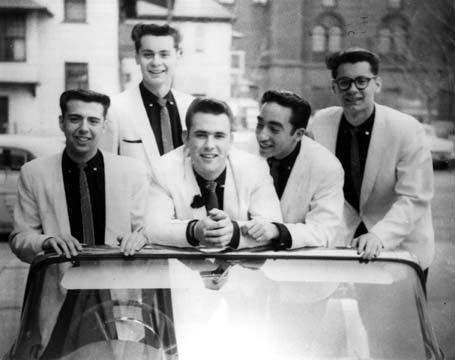By Gary:
I will continue in the vain of relatively unknown and forgotten artists. When I was young, late 50’s early 60’s, a form of music called “Instrumentals” was popular and produced some great songs. I am aware that Instrumentals, as a music form, disappeared probably over 35 years ago, but I just loved it.
This group was a huge favourite of mine, in the late 50’s and early 60’s. This group came out of Dearborn Michigan, not far from Toronto. I loved the honking saxophones and the fantastic drive of the band. They made the top 40 once, but Flamingo Express, which did not make the top 40 was my favourite.

Video:
Music:
One of the better instrumental rock ‘n’ roll acts, the Royaltones hailed from Dearborn in Michigan. They had a longer run than most (1957-1964), the constant presence throughout these years being sax player George Katsakis, who was recently interviewed by Dave Burke and Alan Taylor of Pipeline magazine, for the liner notes of the new Royaltones CD on Ace. George Katsakis (born 1941) started out on clarinet at the age of eight, but later switched to the saxophone. Influences were Clifford Scott, Lee Allen, Red Prysock and Sam Taylor, among others. The group that Katsakis formed in 1957 was initially called the Paragons and included the twin brothers Mike and Greg Popoff (also born 1941). The three youngsters began to write their own instrumentals, one of which was “Poor Boy”. Studio owner Stuart Gorelic was impressed with the acetate of the song and gave them a chance to make a professional recording. For this purpose the group was expanded with guitarist Bob Sanderson and a second sax player, Ken Anderson. Mike Popoff played keyboards and Greg Popoff drums. Gorelic sent the tapes to New York and within three days the group was signed to and released on Jubilee Records, owned by Jerry Blaine, who changed the group’s name to The Royaltones, as there was already a recording group with the name the Paragons. Gorelic also told them that they needed someone over the age of 21 to sign the publishing contract. Although Bob Sanderson (1935-1994) had no hand in writing “Poor Boy”, he was the only one old enough to sign and so he became the official composer of the group’s early group-written tunes. The plan was to sort things out later, but that never happened.
“Poor Boy” entered the Billboard charts in October 1958 and rose to # 17, quite a feat for such a “dirty” instrumental. The flip was the equally exciting “Wail!”, making this one of the classic double-sided rock instrumental 45s of the 1950s. The Popoff brothers then temporarily left the group and were replaced by Bo Savich (drums) and Ken Anderson’s wife Diane on piano. This line-up plays on the second Jubilee single, “See-Saw”/”Little Bo” (Jubilee 5362), again a strong coupling, but this time there was no chart action. “Little Bo” features an extended drum solo by Bo Savich, who soon jumped ship to join that other instrumental R&R outfit from the Detroit area, Johnny and the Hurricanes. Although the group was touring extensively (and with big names, too), there were several problems by 1959. They had received little payment for their efforts and decided to sue Stuart Gorelic, who became involved with the payola scandal, as did Jerry Blaine, who released the group from its Jubilee contract. Diane Anderson became pregnant and had to quit, Sanderson and Savich also left. Fortunately the Popoff brothers returned and guitarist Vern Parker was hired. In 1960, the group signed with George Goldner’s Goldisc label in New York. The Royaltones had seven singles released on Goldisc, the second of which gave them their second (and last) chart entry. It was “Flamingo Express”, which rose to # 82 in the Billboard Hot 100 in early 1961. Despite this success, professional road tours kept eluding the group, who were then working at Morey’s Royal Twist Lounge in Detroit. Two very good musicians joined the Royaltones in 1962 : Dennis Coffey on guitar and Bob Babbitt on bass. Coffey would later score a million seller with the instrumental “Scorpio” (1971, # 6). There were further singles on Twirl (1963) and on Mala (1964), but they sold poorly, except “Our Faded Love” (Mala 473), which made some regional noise. The Twirl label was owned by Harry Balk and Irving Micahnik, who ran Embee Productions. One of their clients was Del Shannon and the Royaltones backed Del on many of his recordings between 1962 and 1964, including big hits like “Little Town Flirt”, “Handyman” and “Keep Searchin'”. Prior to that, George Katsakis had done backing work on the sax for Jack Scott’s Carlton recordings, as early as 1958.
Towards the end of 1964 the Royaltones disbanded. Coffey and Babbitt enjoyed considerable success as studio musicians. Katsakis formed a new band called the Court Jesters, which lasted until 1969. He has remained active in the music business until today.
The Royaltones deserved more success than they actually had. Apart from bad management and sheer bad luck, the group may have been hampered by the lack of a clear style of their own, unlike instrumentalists as Duane Eddy, the Champs, the Ventures, Johnny and the Hurricanes and Bill Black’s Combo.


Morning Gary Now you are on the right track again. (I will try to forget that you ever mentioned an idiotic pantomime act like Paul Revere). I agree that there are a large number of great bands that only made bb once or twice. The Rock-A-Teens, Rockin Rebels, Ramrods to name but three Best Tony
Sent from my iPad